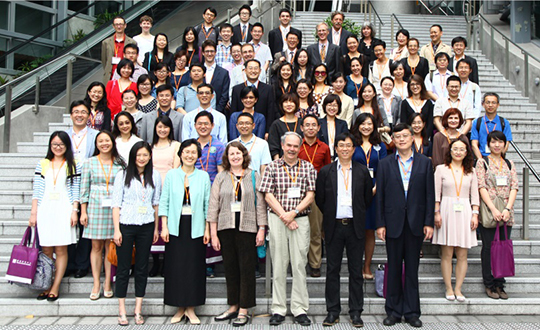The international "Translation and Modernization in East Asia in the 19th and Early 20th Century Conference" was held on 29-31 May 2013 at Yasumoto International Academic Park, The Chinese University of Hong Kong. More than one hundred scholars from Hong Kong, Taiwan, mainland China, and also Japan, Korea, UK, US, Canada, Australia, Germany, Italy and Israel attended the conference and read their papers. This fruitful event was organised by the RCT of the Institute of Chinese Studies, The Chinese University of Hong Kong, supported by the University's Focused Investment Scheme and the RCT Research Programme Fund, and sponsored by the Institute of Chinese Studies. East Asia underwent a process of modernization to cope with the serious challenges brought by the Western powers during the 19th and early 20th centuries, a process characterised by numerous features ranging from military, political, economic, technological and medical reforms to changes in the legal, administrative, diplomatic and educational, literary and media systems. This resulted in long-term socio-political and cultural effects that shaped the "modern" East Asia in the 20th to 21st centuries. As many in the 19th and early 20th centuries saw the West as a model for modernization, modernization in East Asia was more often than not taken as a process of learning from or even imitating the West. Translation played a crucial role when efforts were made to import Western ideas, knowledge, concepts and practices. Although numerous studies have been made of modernization in East Asia, the lack of study of the role of translation in this process has been a major weakness in our understanding of the topic. The conference aimed to study the role played by translation in the modernization process of the East Asian countries in the 19th and early 20th centuries. The speakers, selected from over 170 applicants, were experts in the fields of translation studies, history, literature and various social science disciplines. The RCT also invited three keynote speakers who gave very informative speeches on the relationship between translation and modernization in Korea, Japan and China: - Professor Hyaeweol Choi (Director of the Korea Institute, College of Asia and the Pacific, Australian National University, Australia) illustrated the gender politics that were embedded in translated modernity in colonial Korea.
- Professor Judy Wakabayashi (Modern and Classical Language Studies, Kent State University, United States) described the Meiji government's strategic deployment of non-fiction translation as a vehicle of modernization in Japan.
- Professor Zhenhuan Zou (Department of History, Fudan University, China) focused on Zhang Yuanji and the editing and publishing of the bilingual dictionaries in modern China.
The conference was seen as the first step in establishing a platform for further international collaboration on research into the topic. Selected papers of the conference will be published in the RCT's book series Asian Translation Traditions and Fanyishi Yanjiu Luncong [Studies in Translation History].  |













